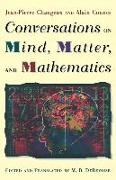Fr. 59.50
J.-P. Connes Changeux, Jean Pierre Changeux, Jean-Pierre Changeux, Jean-Pierre Connes Changeux, Alain Connes, M. B. Debevoise
Conversations on Mind, Matter, and Mathematics
Englisch · Taschenbuch
Versand in der Regel in 1 bis 3 Wochen (kurzfristig nicht lieferbar)
Beschreibung
Do numbers and the other objects of mathematics enjoy a timeless existence independent of human minds, or are they the products of cerebral invention? Do we discover them, as Plato supposed and many others have believed since, or do we construct them? Does mathematics constitute a universal language that in principle would permit human beings to communicate with extraterrestrial civilizations elsewhere in the universe, or is it merely an earthly language that owes its accidental existence to the peculiar evolution of neuronal networks in our brains? Does the physical world actually obey mathematical laws, or does it seem to conform to them simply because physicists have increasingly been able to make mathematical sense of it? Jean-Pierre Changeux, an internationally renowned neurobiologist, and Alain Connes, one of the most eminent living mathematicians, find themselves deeply divided by these questions.
The problematic status of mathematical objects leads Changeux and Connes to the organization and function of the brain, the ways in which its embryonic and post-natal development influences the unfolding of mathematical reasoning and other kinds of thinking, and whether human intelligence can be simulated, modeled,--or actually reproduced-- by mechanical means. The two men go on to pose ethical questions, inquiring into the natural foundations of morality and the possibility that it may have a neural basis underlying its social manifestations. This vivid record of profound disagreement and, at the same time, sincere search for mutual understanding, follows in the tradition of Poincaré, Hadamard, and von Neumann in probing the limits of human experience and intellectual possibility. Why order should exist in the world at all, and why it should be comprehensible to human beings, is the question that lies at the heart of these remarkable dialogues.
Inhaltsverzeichnis
| Translator's Note | Mathematics and the Brain | ||||||||||||||||||||||||
| 2 | Plato as Materialist? | ||||||||||||||||||||||||
| 3 | Nature Made to Order | ||||||||||||||||||||||||
| 4 | The Neuronal Mathematician | ||||||||||||||||||||||||
| 5 | Darwin among the Mathematicians | ||||||||||||||||||||||||
| 6 | Thinking Machines | ||||||||||||||||||||||||
| 7 | The Real and the Rational | ||||||||||||||||||||||||
| Epilogue: Ethical Questions | |||||||||||||||||||||||||
| Glossary of Mathematical Terms | |||||||||||||||||||||||||
| Glossary of Neurobiological Terms | |||||||||||||||||||||||||
Index
Über den Autor / die AutorinJean-Pierre Changeux is Director of the Molecular Neurobiology Laboratory at the Institut Pasteur in Paris and Professor at the Collège de France. Alain Connes, winner of the 1982 Fields Medal, is Professor of Mathematics at the Institut des Hautes Études Scientifiques in Bures-sur-Yvette and Professor at the Collège de France. ZusammenfassungDo numbers and the other objects of mathematics enjoy a timeless existence independent of human minds, or are they the products of cerebral invention? Do we discover them, as Plato supposed and many others have believed since, or do we construct them? Does mathematics constitute a universal language that in principle would permit human beings to communicate with extraterrestrial civilizations elsewhere in the universe, or is it merely an earthly language that owes its accidental existence to the peculiar evolution of neuronal networks in our brains? Does the physical world actually obey mathematical laws, or does it seem to conform to them simply because physicists have increasingly been able to make mathematical sense of it? Jean-Pierre Changeux, an internationally renowned neurobiologist, and Alain Connes, one of the most eminent living mathematicians, find themselves deeply divided by these questions. Zusatztext"The record of an intellectual encounter between two of Franco's leading scientific figures. . . . The result is a smooth, easy-to-read representation of a protracted, interesting . . . exchange between Alain Connes, an eminent mathematician, . . . and Jean-Pierre Changeux, a distinguished biologist."---Brian Rotman, Times Literary Supplement Produktdetails
KundenrezensionenZu diesem Artikel wurden noch keine Rezensionen verfasst. Schreibe die erste Bewertung und sei anderen Benutzern bei der Kaufentscheidung behilflich. Schreibe eine RezensionTop oder Flop? Schreibe deine eigene Rezension. | |||||||||||||||||||||||||

